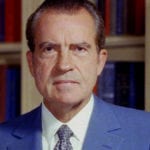 History
History  History
History  Weird Stuff
Weird Stuff 10 Wacky Conspiracy Theories You Will Need to Sit Down For
 Movies and TV
Movies and TV 10 Weird Ways That TV Shows Were Censored
 Our World
Our World 10 Places with Geological Features That Shouldn’t Exist
 Crime
Crime 10 Dark Details of the “Bodies in the Barrels” Murders
 Animals
Animals The Animal Kingdom’s 10 Greatest Dance Moves
 Movies and TV
Movies and TV 10 Box Office Bombs That We Should Have Predicted in 2025
 History
History 10 Extreme Laws That Tried to Engineer Society
 History
History 10 “Modern” Problems with Surprising Historical Analogs
 Health
Health 10 Everyday Activities That Secretly Alter Consciousness
 History
History 10 Dirty Government Secrets Revealed by Declassified Files
 Weird Stuff
Weird Stuff 10 Wacky Conspiracy Theories You Will Need to Sit Down For
 Movies and TV
Movies and TV 10 Weird Ways That TV Shows Were Censored
Who's Behind Listverse?

Jamie Frater
Head Editor
Jamie founded Listverse due to an insatiable desire to share fascinating, obscure, and bizarre facts. He has been a guest speaker on numerous national radio and television stations and is a five time published author.
More About Us Our World
Our World 10 Places with Geological Features That Shouldn’t Exist
 Crime
Crime 10 Dark Details of the “Bodies in the Barrels” Murders
 Animals
Animals The Animal Kingdom’s 10 Greatest Dance Moves
 Movies and TV
Movies and TV 10 Box Office Bombs That We Should Have Predicted in 2025
 History
History 10 Extreme Laws That Tried to Engineer Society
 History
History 10 “Modern” Problems with Surprising Historical Analogs
 Health
Health 10 Everyday Activities That Secretly Alter Consciousness
Top 10 ’90s Songs You Didn’t Realize Were So Heartbreaking
The 1990s had a wide array of musical acts. The beginning of the decade saw the decline of hair bands and the entrance of grunge music, which would dominate until the mid-1990s. With the new millennium on the horizon, pop music was king. The Backstreet Boys, Britney Spears, and NSYNC controlled the charts.
But many of the most popular songs—songs that ruled the radio—had dark, somber stories behind them. Here’s a look at songs you know by heart but had no idea were written in the depths of despair.
Related: 10 Tragic Events That Created Iconic Pieces Of Pop Culture
9 “Under the Bridge”
Red Hot Chilli Peppers
The second single from the band’s 1991 album Blood Sugar Sex Magik” peaked at number two on the Billboard Hot 100 chart. “Under the Bridge” is easily one of the most famous and beloved Chili Peppers songs, but its funky beat and catchy hook can easily mask the pain behind the lyrics.
Lead singer Anthony Kiedis wrote the song during a period of sobriety. He’d struggled through a heroin and cocaine addiction and penned the poem after a day of rehearsals where his bandmates were still smoking marijuana.
His feelings of loneliness made him reflect on his past drug use and darker days when he would buy drugs under a bridge in L.A., even though it was right in the middle of gang territory.[1]
9 “No Rain”
Blind Melon
The uptempo, catchy track, complete with the iconic bee girl video, is full of happy vibes, right? Nope. Bass player Brad Smith wrote the breakthrough hit, but it definitely wasn’t coming from a place of happiness.
He wrote the song based on the perspective of his girlfriend at the time, who was depressed. Smith said that she slept during the day and complained when there was no rain. After penning the piece, he realized it wasn’t just about her—he shared the same feelings of despair.
The band was no stranger to depression. Their lead singer Shannon Hood struggled to cope with his own demons and died of a drug overdose in 1995.[2]
8 “Zombie”
The Cranberries
The Irish rock band rose to fame in 1994 behind their debut album Everybody Else Is Doing It, So Why Can’t We? Smack dab amid grunge and Britpop, The Cranberries were unique. Lead vocalist Dolores O’Riordan’s melancholic voice, complete with lilts and yodels, exuded emotion, and the band’s catchy tunes easily landed them on the Billboard Hot 100. Their second studio album, No Need to Argue, featured the hit song “Zombie.”
O’Riordan penned the song following the IRA-linked bombing in England that killed two small boys in 1993. She made it clear to the band that she wanted the music to sound edgy and angry to express her frustration. The distorted guitars and hard drums appealed to audiences who were in the throes of a grunge renaissance. The song quickly gained airplay and made the album No Need to Argue the band’s best-selling one.[3]
7 “Don’t Speak”
No Doubt
The ska-punk band from Orange County featured Gwen Stefani as the platinum blonde, red-lipped bombshell lead singer. By the time Tragic Kingdom was released in 1995, the band already had two albums under their belt, but neither had been big performers. Maybe that was because Stefani had a limited role in the writing process for the first two but took center stage on the band’s third album.
She penned “Don’t Speak” about her breakup with bassist Tony Kanal. Stefani had plans to marry Kanal, but he dashed those hopes when he ended their relationship. Stefani was devastated and put pen to paper to cope with her despair. The song about their breakup and how much it hurt Stefani played out again and again as the band gained more fans and had to answer questions about it in interviews. While it was brutal at the time, both Stefani and Kanal say it helped them cultivate the friendship they have today.[4]
6 “3 AM”
Matchbox Twenty
Matchbox Twenty was all over the radio in the mid-1990s. Their songs were overplayed to the point of nausea. But while the band was mainstream darlings of radio, they also had a great talent in singer/songwriter Rob Thomas. His emotional deliveries, combined with touching lyrics, made for some superb performances.
While “3 AM” was an uptempo song, a close listen to the lyrics reveals Thomas’s heartbreaking truth. He wrote the song about his mother’s battle with cancer when he was only a teenager. In an episode of VH1’s Storytellers, Thomas tells the audience no one really knew it was about his mother but instead thought it was about a lost love.
Thomas described it as a “weird time” trying to care for himself and his mother and wondering why she was always tired and slept all the time.[5]
5 “The Freshman”
The Verve Pipe
From the band’s second studio album Villians came one of their only hits. “The Freshman” was a slow, gentle, and moody song. It reached number 5 on the Billboard Hot 100 chart in 1997 and garnered a place in history for the band.
The lyrics, written by the singer Brian Vander Ark, tell the tale of a girl who has an abortion and is so distraught over it that she commits suicide. Part of the tale is autobiographical as Vander Ark says that both he and another guy were dating the same girl, and she got pregnant by one of them. No one knew who the father was, and the girl ended up getting an abortion. After that, he took a bit of poetic license and added the suicide part to build on the tragedy.[6]
4 “Santa Monica”
Everclear
The alt band Everclear had a slew of hits in the 1990s, and their poppy, sunny song “Santa Monica” seems like any other feel-good tune until you take a closer listen. Written by frontman Art Alexakis, it’s inspired by traumatic events in his life.
When Alexakis was a teenager, his brother died of a heroin overdose, and just a short time later, his girlfriend committed suicide. Alexakis was so distraught that he jumped off the Santa Monica Pier, intending to kill himself.
Alexakis’s personal tragedies inspired many of the lyrics on Everclear’s albums. He dealt with his own drug addiction, abandonment from his father, and even a rape in his childhood through his music. While the videos and sounds are upbeat and sunny, the underlying dark themes were common on Everclear’s albums.[7]
3 “Today”
Smashing Pumpkins
The Smashing Pumpkins kind of squeaked through the 1990s as an “in the middle” band. They weren’t exactly grunge but weren’t pop or rock, just something in between. Known for songs with elaborate string sections and Billy Corgan’s unique vocals, The Smashing Pumpkins toured their way onto the charts.
“Today,” the second single from their 1993 album Siamese Dream, seems almost hopeful. With song lyrics like “Today is the greatest day I’ve ever known,” the song is far from the positive message first alluded to. In fact, Corgan wrote it during one of his darkest periods. A time when he regularly thought about killing himself.[8]
2 ; “The Kids Aren’t Alright”
The Offspring
The California punk band was never known for its hard-hitting songwriting. In fact, they were more known for their catchy riffs, goofy music videos, and satirical take on white suburbia. With songs like “Why Don’t You Get a Job” and “Pretty Fly (For a White Guy),” The Offspring was looking for laughs instead of taking a stand.
That changed when it came to their third single released off their 1998 album, “Americana. “The Kids Aren’t Alright” is perhaps the closest thing to social commentary from the band. While the other songs are jokey and lighthearted, “The Kids Aren’t Alright” delves into the darker side of everyday America.
Written by lead singer Dexter Holland after a visit back to his hometown, he noticed many former friends and acquaintances were suffering and falling on hard times. There were suicides, drug addictions, and job losses that didn’t coincide with the sunny futures everyone talked about growing up. Holland wanted to highlight this illusion and show that kids were really struggling, even in America.[9]
1 “Alive”
Pearl Jam
No ’90s list is complete without mentioning one of the surviving, iconic Seattle-based grunge bands. Pearl Jam was well known around their hometown, but it wasn’t until their debut album Ten came out in 1991 that they became a household name. Behind Eddie Vedder’s emotional deliveries, Pearl Jam topped the charts with hit after hit.
The debut single “Alive” almost seems like an uplifting song at first—until you dive into the lyrics. Written by Vedder, “Alive” tells the story of a young boy who finds out his father is actually his stepfather. His real father is dead. Based on Vedder’s own chaotic childhood, the song confronts this truth and how Vedder tries to deal with it.
These days, Vedder says the meaning of the song changed slightly. The “I’m still alive” chorus now has a positive spin—it’s a celebration—he is indeed still alive.[10]








